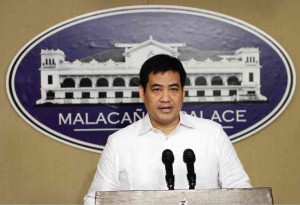MANILA, Philippines–Malacañang on Wednesday stood by its Disbursement Acceleration Program (DAP), insisting that it “acted in good faith” when it spent P142.23 billion in pooled and realigned savings from different government agencies, a practice that the Supreme Court ruled unconstitutional.
Presidential spokesman Edwin Lacierda questioned why some groups were calling for the impeachment of President Aquino, saying the “unconstitutionality” of the budget mechanism should not necessarily be “equated to criminality.”
“The basic question is: Was the money wasted?” he said at a press briefing where he was grilled for more than an hour on the DAP.
Lacierda said the Palace would wait for the full text of the Supreme Court decision on the DAP before deciding whether to appeal the ruling.
Lacierda rattled off some projects, such as school buildings and Doppler radars, which he described as “benefits” funded by DAP money. But citing the sub judice rule, he declined to release the list of 116 DAP-funded projects Budget Secretary Florencio Abad earlier promised to make public.
The Palace also defended Abad, chief architect of the budget impounding system, saying he still enjoyed the trust of the President.
Not impeachable
Lacierda cited cases involving previous administrations in which several executive actions had been deemed unconstitutional but “never reached the level of impeachability.”
“I can give you examples in the past administration, in the Arroyo administration, or in the Ramos administration where acts were declared unconstitutional. So why is there a sudden concern for accountability?” he asked.
“We have always believed that the President has served with integrity and faithfulness, and the Filipino people know that very well.”
Until it was scrapped last year, the DAP allowed the Department of Budget and Management to collect “savings” from different agencies.
But the high court declared unconstitutional the “cross-border transfer of the savings of the executive to augment the appropriations of other offices” belonging to other branches of government.
Interdependence
In justifying the practice, Lacierda cited the Office of the Solicitor General’s position that the transfer of funds from one government branch to another involved “interdependence.”
Malacañang also came under fire for using a portion of DAP money to allegedly bribe senators into voting to convict then Chief Justice Renato Corona in 2012.
By Abad’s own admission, 20 senators received a total of P1.107 billion in lump-sum appropriations some six months after Corona was ousted.
Lacierda sought to dispel suggestions that Aquino, who authorized the DAP and even defended it vigorously last year, was not properly advised by his legal team.
“The executive branch always has the prerogative of interpreting the rules as it sees fit. And when that particular interpretation is questioned, that’s when the court comes in,” he said.
Despite the setback in the high tribunal, the Palace was not inclined to castigate officials who cooked up the program.
“Again, our position is that we have used the funds for its intended purpose of accelerating projects—projects like building school buildings, providing Doppler radar—to the benefit of the Filipino people,” Lacierda said.
“We cannot step back and say we regret doing those things that benefited the people.”
Operative fact doctrine
A legal principle called “doctrine of operative fact” might alleviate the blow the Aquino administration took from the Supreme Court ruling.
An administration source on Wednesday floated the idea that if the “operative fact doctrine” is in the Supreme Court decision, then the Aquino administration and the senators who spent a total of P1.1 billion for government projects under the DAP need not return the money to government coffers.
The doctrine states “the effects of the unconstitutional law, prior to its declaration of nullity, may be left undisturbed as a matter of equity and fair play. In fact, the invocation of the operative fact doctrine is an admission that the law is unconstitutional,” the Supreme Court said in its August 2010 decision in the League of Cities of the Philippines v. the Commission on Elections, et al.
The same decision stressed that the operative fact doctrine was more an exception “to the general rule that an unconstitutional law produces no effects.”
“It can never be invoked to validate as constitutional an unconstitutional act,” it said.
The source, who asked not to be identified for lack of authority to speak to the media, also furnished the Inquirer other Supreme Court decisions wherein the operative fact doctrine figured.
In Planters Products Inc. v. Fertiphil Corp., decided in 2008, the high court also invoked this legal doctrine, saying it is applicable “when a declaration of unconstitutionality will impose an undue burden on those who have relied on the valid law.”
Binay’s support
Vice President Jejomar Binay called on people Wednesday to support Aquino amid calls for the latter’s impeachment.
“President Aquino is our leader and has been duly elected by our people. He has the people’s mandate and we should continue supporting him as our President,” Binay said in a statement.
“I encourage everybody to accept and respect the ruling of the Supreme Court. Let the effect take its legal course and consequence, and avoid speculation,” he said.–With reports from Nikko Dizon and Christine O. Avendaño
